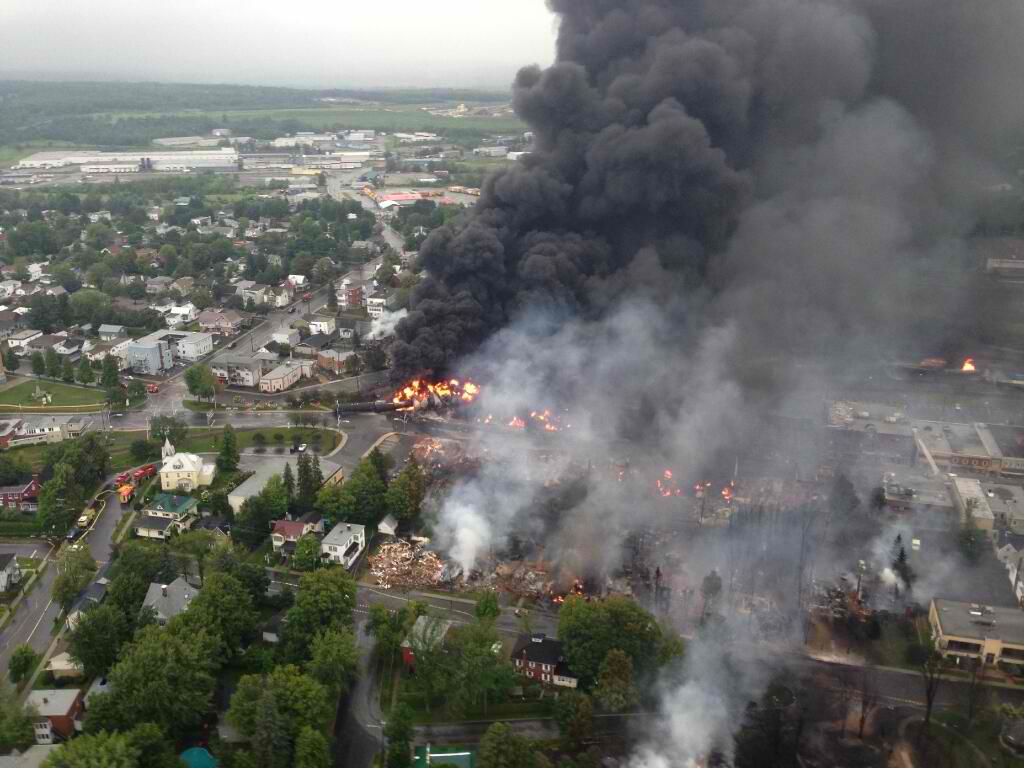
MONTREAL—The union and lawyers representing two railway employees accused in the Lac-Megantic disaster are urging the Crown to drop the charges in light of recent findings by the Transportation Safety Board.
Engineer Tom Harding, railway traffic controller Richard Labrie and Jean Demaitre, the manager of train operations, each face 47 counts of criminal negligence causing death—one for each victim of last summer’s oil-train derailment in the Quebec town.
A conviction carries a maximum life sentence.
On Thursday, the attorneys for Harding and Labrie, as well as a union official, called on prosecutors to re-evaluate their cases following the release of last week’s TSB report into the catastrophe. Demaitre was not unionized.
In its findings, the TSB criticized the Montreal, Maine and Atlantic railway for its “weak safety culture” and also targeted Transport Canada for its poor oversight of the industry, particularly amid a boom in oil-by-rail shipments across the continent.
“We’re asking the Crown to revise the charges against the workers implicated in Megantic,” Daniel Roy, Quebec director of the United Steelworkers, told a news conference.
“We can see who’s really responsible for this event, this whole tragedy.”
Later in the day, however, a spokesman for the prosecutor’s office said the TSB report does not change anything about the police evidence that was already evaluated by the Crown. Therefore, proceedings are expected to move ahead.
The TSB report, the first comprehensive account of the derailment released to the public, identified 18 contributing factors it says led to the crash.
Among the factors, the TSB said Harding applied an insufficient number of hand brakes on the train and conducted an inadequate test before he left the convoy unattended for the night.
Attorney Thomas Walsh, who represents Harding, said his client’s actions amounted to “human error,” not “wanton and reckless disregard,” which he added was necessary for a criminal-negligence conviction.
He also pointed to the TSB’s findings on Transport Canada and the MMA.
The TSB report concluded that the railway did not thoroughly identify security risks, nor did it have a functioning safety management system—both contributing factors to the crash.
The company Montreal, Maine and Atlantic Canada, a subsidiary of the now-bankrupt MMA, was charged in the case, but Walsh asked what good could come from accusing a company that can’t be punished.
“You have to pierce the curtain which protects the people who are actually out there neglecting things,” he said.
Walsh went a step further, calling on authorities to read the TSB report closely and consider pressing charges against corporate and government officials whose decisions may have had a hand in creating systemic deficiencies.
“Who’s responsible for the system? Walsh asked.
“It’s not Thomas Harding. He works in that system.”
He also suggested that a public inquiry be called to examine the disaster, an inquest he said could help dig deep into all the factors behind it.
“I think the public has interest in finding out what the real causes of the tragedy are and making sure that they’re avoided,” he said.
The next court date for the three men has been set for Sept. 11.
Walsh said the Crown has yet to disclose on what basis they made the accusations against Harding.
He said he might advise the judge that he intends to present a motion to require the Crown to explain why it charged his client.
Roy, meanwhile, took particular aim at federal cabinet ministers for their reactions to the TSB document.
He accused Transport Minister Lisa Raitt, her predecessor Denis Lebel and Public Safety Minister Steven Blaney of either deflecting blame or dismissing the TSB findings.
“Here we have a government that’s washing its hands,” Roy said.
“Not even the humility, the decency, to accept their responsibility. It’s shocking.”
A spokeswoman for Raitt declined an interview request Thursday, but said the minister would deliver a formal response within 90 days of the release of the report.
“As we have always said, and as the TSB report indicates, this is a case where rules were not followed,” Jana Regimbal wrote in an email.
“That being said, the report sets out higher expectations of Transport Canada in the area of oversight. The public shares these expectations and so does our government.”
Lebel, who was shuffled from the transport portfolio to infrastructure about a week after the disaster, was not available Thursday to comment on the allegations, his spokesman said.
Quebec provincial police said recently the investigation remains active, which could lead to more arrests.
The three accused were arraigned in Lac-Megantic last May. At the time, Walsh said Harding intended to plead not guilty to the charges.
Walsh also said he asked the court for a jury trial in the devastated community.
Several locals who watched the suspects enter the courtroom said they hoped authorities would eventually lay charges against railway and government officials.
In releasing her report, TSB chair Wendy Tadros said the underlying causes of the accident go well beyond the number of hand brakes applied and the engineer’s actions that night.
Before he left the scene, Harding called MMA’s dispatcher to report mechanical problems on the locomotive and thick smoke belching from its exhaust. They agreed he could leave the engine for the night, so he retired to a hotel.
Later in the night, a fire broke out on the locomotive. Firefighters called to the scene shut down the engine, which allowed engine’s air brakes to slowly disengage.
An MMA track foreman with no background in locomotives met the firefighters at the scene and, after consulting the rail-traffic controller, they left without restarting the locomotive. Eventually, the train started rolling toward Lac-Megantic, where it derailed and exploded.